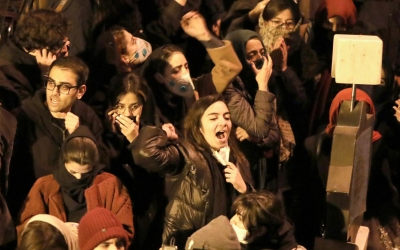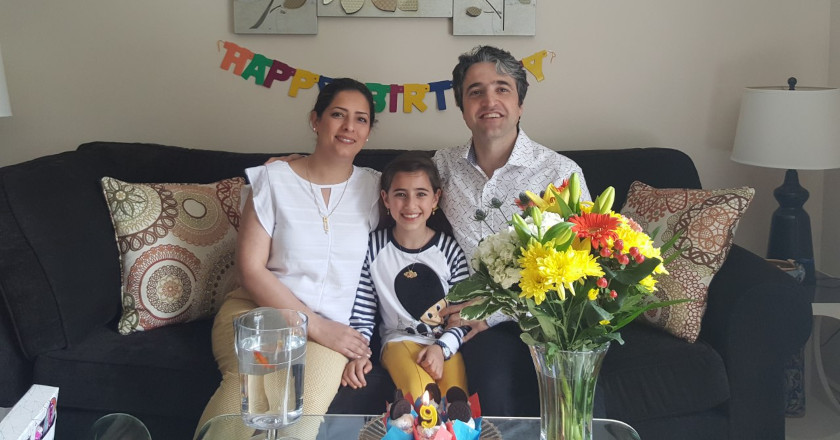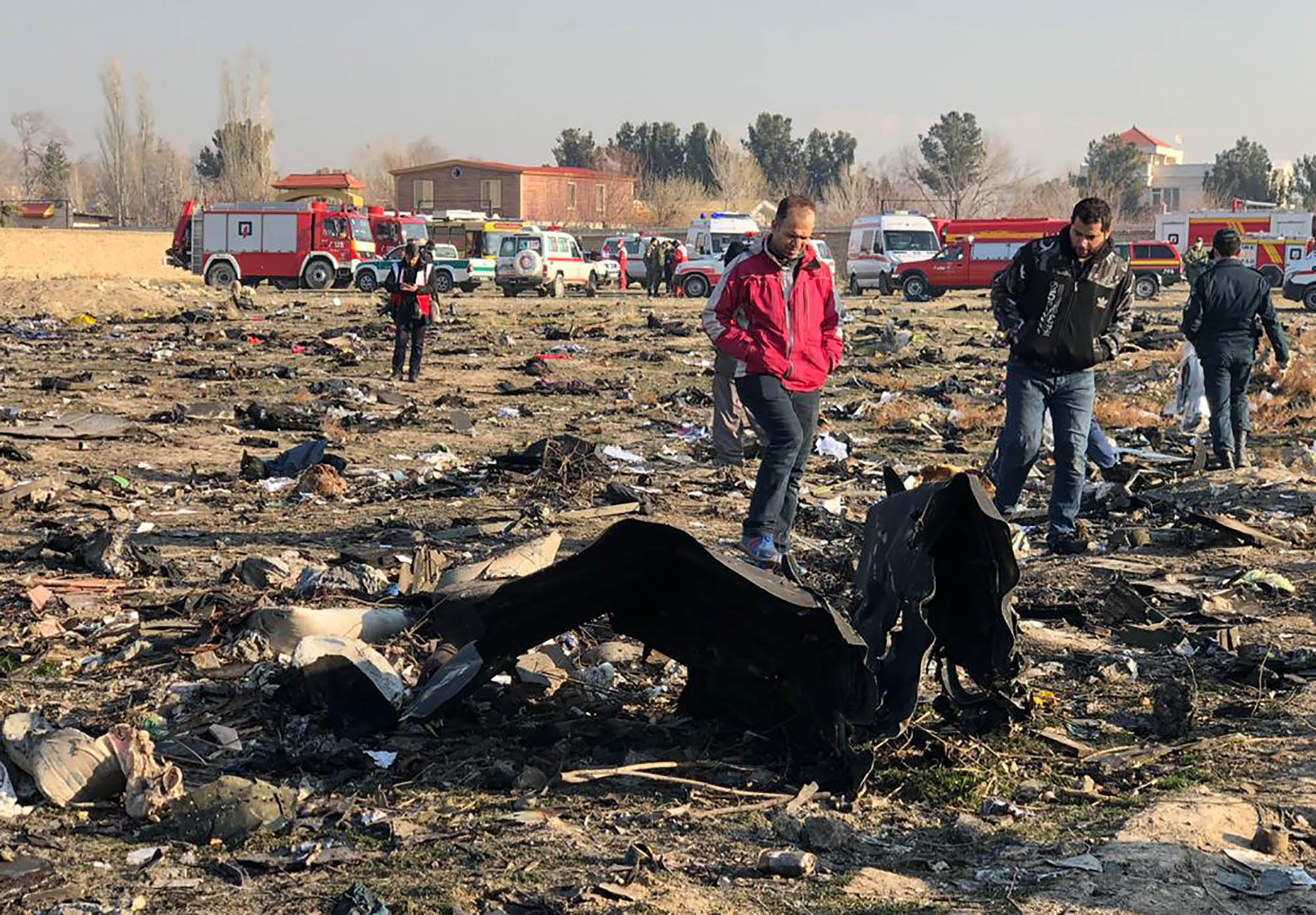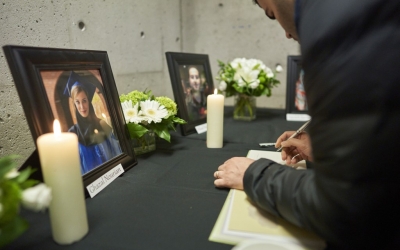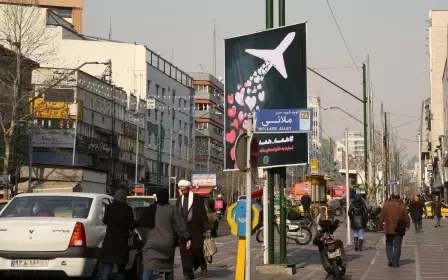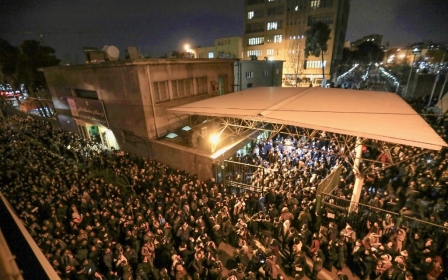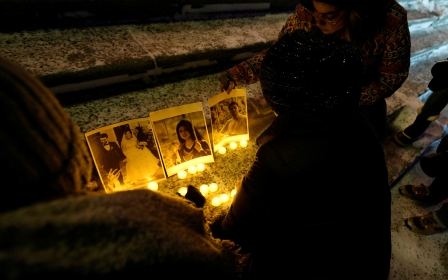Iran plane crash: No closure for families of victims one year on
It’s been a year since Ukrainian International Airlines flight PS752 was destroyed minutes after takeoff in the skies above Tehran.
Before dawn on 8 January 2020, the lives of many families were changed forever when two missiles, fired by Iranian forces, killed 176 of their loved ones on board the Ukrainian passenger plane.
To their dismay, Tehran has not taken any action or offered answers that the victims’ families say they need to be able to finally mourn and be at peace. They have accused Iranian authorities of harassment, persecution and stonewalling their quest for justice, as an investigation lacking in transparency drags on.
'That night, Iran’s sky was like a sky of war...We expected the worst'
- Fatemeh Latifi, aunt of a victim
Tehran has claimed human error to be behind the incident, which took place during particularly heightened tension between Iran and the United States.
Five days earlier, Iranian senior general Qassem Soleimani, the head of the elite Quds force, was killed by a US drone strike in Baghdad, leaving the Islamic republic on edge.
New MEE newsletter: Jerusalem Dispatch
Sign up to get the latest insights and analysis on Israel-Palestine, alongside Turkey Unpacked and other MEE newsletters
A few hours before the crash, a series of Iranian ballistic missiles struck US facilities in Iraq. That night, Iranian forces mistook the commercial flight for a cruise missile and subsequent poor military communication led to the disaster.
Families of victims, however, remain sceptical about the official account and have been leading a campaign to pressure Iran to reveal the truth behind that fateful night.
The distrust of the official account started with the initial report given by authorities that a technical error had caused the plane to crash, and with subsequent denials that Iranian forces had shot down the plane, despite mounting evidence pointing to the contrary.
Thus began the families’ journey to justice.
Three days of nightmare
Hamed Esmaeilion, an Iranian-Canadian living in Toronto, was waiting for the return of his daughter and wife who had gone to Iran on a 12-day trip.
"It was obvious to me and to everyone else: in such conditions, flights should have been cancelled," he said.
But flight PS752 took off from Tehran, only to crash three minutes later.
Immediately after the incident, Esmaeilion decided to travel to Iran.
He had a stopover in Frankfurt, where he met other families of victims who were also on their way to Iran.
“We cried, and moaned in pain together. Then we embarked to fly to Iran,” he told MEE.
“While we were flying over Turkey, I heard [US President] Donald Trump’s declaration on CNN in which he said that flight PS752 had been taken down by an Iranian missile.
“A few minutes later, our pilot announced that our flight was turning back. We were returning to Frankfurt,” Esmaeilion said.
“I spent the worst night of my life in an airport hotel room near Frankfurt.”
The following day, making a detour through Azerbaijan, Esmaeilion managed to reach Iran. Devastated, he expressed his anger on social media. He did not believe the argument of a technical failure put forward by the Iranian authorities.
Concerned about retaliation from the Iranian government because of his attacks on social media, Esmaeilion's relatives begged him to stop expressing himself so publicly, to no avail.
“I could not remain silent. I could not believe it. The Iranian military had allowed a commercial flight to take off amid a war situation before shooting it down as it took off the runway,” he said.
The next three days were a nightmare for him as Tehran strove to deny evidence that suggested it was responsible for the tragedy.
‘Victims, not martyrs’
An amateur video, widely shared on social media, had however left no room for doubt as it clearly showed one missile after the other hitting the plane, causing explosions. Another video showed the plane on fire and heading back to the airport, and minutes later it exploded and crashed.
“For three days, they lied and continued to pretend it was an accident. They tried to hide evidence. The site was not locked down and everyone could go there and move things around,” said Armin Morattab, an Iranian-Canadian who lost his twin brother and sister-in-law.
'My wife and daughter are not martyrs, they were just civilians going back home'
- Hamed Esmaeilion
The procession of Iranian officials on television denying responsibility caused outrage among the victims’ families. The director of the Iranian aviation organisation on 10 January declared: “One thing is certain: this plane was not struck by a missile.”
On 11 January, Iranian President Hassan Rouhani announced that the army’s internal investigation had concluded that the passenger plane was mistakenly hit by missiles, adding that it was a “great tragedy” and an “unforgivable mistake”.
There was no doubt for the families of the victims, however, that the Iranian authorities knew the truth from the first minutes of the incident.
“If there had been no foreigners on board, Canadians, British, Ukrainians… They would have kept hiding the truth till this day,” claimed Morattab.
Victims received a national homage in Iran, with authorities raising them to the rank of “martyrs”.
“Can you believe it?” an incredulous Morattab said.
“My brother and my sister-in-law were put in coffins covered by the Iranian flag without even consulting us in the first place.”
Morattab’s family categorically refused to have his body put in a martyr’s vault. They were able to ensure that their loved one would be buried in Sanandaj, his city of origin, instead of a martyr’s burial site. Esmaelion, meanwhile, engaged in tough negotiations in order to repatriate the remains of his wife and daughter.
“This is what convinced me to stay alive; I was destroyed but I didn’t want them to be buried in Iran. The Iranian government played a dirty game,” he said.
“My wife and daughter are not martyrs, they were just civilians going back home."
‘A sky of war’
For the relatives living in Iran, the situation was even more difficult.
Fatemeh Latifi, whose nephew was one of the passengers of flight PS752, was living in Iran at the time of the incident.
“That night, Iran’s sky was like a sky of war. Everybody here remembers the Iran-Iraq war [1980-1988] and the destruction it carried all the way to Tehran,” she said.
“We expected the worst.”
Latifi was one of many who repeatedly demonstrated for the truth and was eventually detained in Iran, where authorities have been pressuring the victims’ families to not stir up trouble.
She had made videos and sent them to Persian television station Manoto, which broadcasts from London. But despite early threats from the Revolutionary Guard, she persisted.
“Manoto aired a special programme about the tragedy. Right afterwards, they put me in detention. I’ll never forget these days,” she said.
Latifi said she had endured violence, including sexual harassment, while in a detention centre in Karaj.
“I managed to get out of jail thanks to my family’s connections. Then I fled by crossing the Turkish-Iranian border in the middle of the night and found refuge in Canada where I’ve been living since,” she said.
Latifi said her family has also been threatened not to pressure the government about the plane crash.
According to the PS752 Association, founded on behalf of the victims, at least 22 people were arrested during demonstrations related to the Ukrainian airline crash.
Never-ending investigation
Since then, relatives of victims started organising and uniting their forces. Esmaeilion became the spokesperson of the Association of Families of Flight PS752 Victims, which connects around 120 families.
“Our objective is to obtain justice, but also to maintain the memory of our deceased relatives in any possible way,” he said.
The handling of the flight recordings has been at the centre of a diplomatic struggle. Iran, which lacks the technical capacity to analyse the black box tapes, has refused to deliver them to the United States.
After months of negotiations and international pressure, especially by Canada and Ukraine, Tehran finally agreed to hand over the recordings to the French Bureau of Enquiry and Analysis for Civil Aviation Safety (BEA) while keeping command over the investigation.
Morattab said that details of the flight recordings are crucial for the families in their quest for truth as many questions remain unanswered.
“When was the first missile fired, did the flight try to get back on the ground and land in Tehran? Experts claim the flight was trying to turn around, but we still don’t know,” he said.
The families hope to decipher every step of that horrific night as well as identify those responsible. Some family members believe that the hypothesis of a "human mistake" related to the "bad settings of a military radar followed by other technical dysfunctions" put forth by Iranian authorities is not convincing enough.
“The media and government speak of an accident. For many families, it was an intentional act. We need facts. And we cannot be satisfied by the official statements,” said Esmaeilion.
The families’ apprehensions grew further as the five-page report released by the International Civil Aviation Organisation (ICAO) did not contain any additional details about the incident.
“We have not learned anything about the moments preceding the flight, the chain of command or even the circumstances of the missile launching,” Morratab said.
“This report is disturbing. We are deeply hurt by it.”
Incensed, the families organised an international demonstration on 5 October, demanding that the ICAO reveal the full details of the investigation and called for a “roadmap to justice”.
At least nine gatherings took place in Toronto, Washington, London, Frankfurt and other cities.
Governments have also protested over Iran’s handling of the situation. Ukraine expressed its discontent with Tehran dragging its feet in the investigation. Meanwhile, in a recent report, Canada’s Ministry of Foreign Affairs put forward more than 20 questions that have yet to be answered by Iran’s reports on the crash.
A slap in the face
Despite not having conducted a transparent investigation, Iran unilaterally decided to allocate $150,000 for the families of each of the 176 victims.
Ukraine described Iran’s handling of the situation as “unacceptable”, and said the amount of compensation should be negotiated.
'Without truth and justice, nobody will be able to grieve for their lost ones'
- Hamed Esmaeilion
The compensation was also not welcomed by many of the victims’ families.
“The compensation is like a slap in the face and is insulting. How could a compensation without investigation be acceptable?” Morattab said.
“It’s a way to request silence from the families. We refuse it as it is insulting.”
But even as they know that their struggle will be long, the families still have hope for justice.
“Without truth and justice, nobody will be able to grieve for their lost ones,” Esmaeilion said.
“I still haven’t been able to open any of my photo albums since the tragedy. We cannot accept that a murderer investigates a murder, even if regulation allows it.”
Middle East Eye delivers independent and unrivalled coverage and analysis of the Middle East, North Africa and beyond. To learn more about republishing this content and the associated fees, please fill out this form. More about MEE can be found here.


